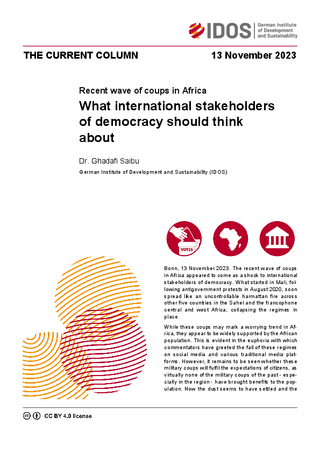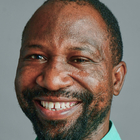Recent wave of coups in Africa
What international stakeholders of democracy should think about
Saibu, GhadafiThe Current Column (2023)
Bonn: German Institute of Development and Sustainability (IDOS), The Current Column of 13 November 2023
Bonn, 13 November 2023. The recent wave of coups in Africa appeared to come as a shock to international stakeholders of democracy. What started in Mali, following antigovernment protests in August 2020, soon spread like an uncontrollable harmattan fire across other five countries in the Sahel and the francophone central and west Africa, collapsing the regimes in place.
While these coups may mark a worrying trend in Africa, they appear to be widely supported by the African population. This is evident in the euphoria with which commentators have greeted the fall of these regimes on social media and various traditional media platforms. However, it remains to be seen whether these military coups will fulfil the expectations of citizens, as virtually none of the military coups of the past - especially in the region - have brought benefits to the population. Now the dust seems to have settled and the international actors who are interested in democratization should learn lessons from what has happened in order to avoid further coups in Africa.
International actors should pay close attention to what kind of democracies they support in Africa. Currently, many African countries are long-term electoral autocracies (hybrid regimes) that have long packaged themselves as democracies under the guise of elections. However, the actions or inactions of international of democracy stakeholders in Africa suggest an uncompromising endorsement of these hybrid regimes, rather than pushing for more complete democracies. Almost 64% of net development aid from all donors goes to countries that are not considered fully democratic according to internationally recognized democracy indices such as the Varieties of Democracy Index.
This implies that foreign aid continues to stabilise incomplete democracies.
As a result, democracy in Africa has been reduced to a cyclical event involving seemingly successful conduct of elections with all its systemic flaws. For instance, between 1990 and 2023, about 70% of regimes in Africa were either closed autocracies (17.6%) or electoral autocracies (51.7%); and 25.1 % were electoral democracies. Only 5.6% of the regimes were liberal democracies.The most common form of government in African countries thus seems to be the electoral autocratic regime that holds de facto multi-party elections for the head of the executive, but falls short of democratic standards due to significant irregularities and limitations on party competition.
Supporting these hybrid regimes as a standard form of democracy by international stakeholders creates the impression that a functioning democracy is in place, but in fact, they are not sustainable. Their hallmark is lack of vertical and horizontal democratic accountability, gross misappropriation of public funds and resources. Citizens vote in the expectation that elected leaders will deliver on their expectations. Yet, because of the inherent institutional weakness and incoherence of electoral autocracies, nothing commits the leaders to deliver or prevent them from abusing power. Thus, many African governments fail to deliver much-needed public goods for their citizens, and public corruption is widespread.
The crux now is that these regimes validate themselves as democracies through seemingly democratic elections. Citizens, who are suffering from the ineptitude of their government, increasingly doubt the democratic idea. Its rejection and the tolerance of other forms of government, like military rule, are becoming increasingly popular. The coups were supported and celebrated by citizens across Africa, not because African citizens do not like democracy. But, because they are dissatisfied with the way democracy has been working – or not working – in their countries.
Another key point concerns unjust colonial and post-colonial policy agreements between African leaders and former colonizers. These agreements fuel sentiments and increase the potential of coups. This was the case with the anti-colonial sentiment against France in the recent coups. Citizens resent unfair tax agreements, the Air France monopoly in Francophone countries, biased military cooperation and the dominance of French companies, in the uranium mines, for instance. This has been amplified by the world’s opposing super-powers to leverage competitive advantage and establish dominance in the sub-region. Russia, for example, allegedly used disinformation strategies in African countries to whip up sentiments in favour of anti-democratic actors in the sub-region. Military juntas in these countries often strategically refer to Russia. Yet, in many of these countries, Russia’s role is much more rhetoric in the current geopolitical space rather than action on the ground.
In sum, democratic stakeholders, including ECOWAS, should facilitate the institutionalisation and deepening of democratic procedures beyond elections. The current approach of accepting hybrid regimes as a valid form of democracy by international stakeholders suggests that electoral autocracies meet liberal norms. They should, however, rather be considered as a fragile stage of democracy and further steps towards democratization should be incentivised. Moreover, unjust colonial and post-colonial policy agreements relating to the exploitation of natural resources must also be addressed!


